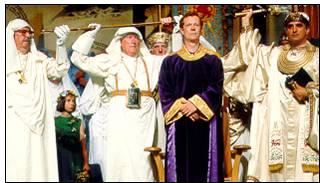History
 The National Eisteddfod of Wales can be traced back to
1176 when the first Eisteddfod was held at the Cardigan castle of Lord
Rhys. There he held a grand gathering to which he invited
poets and musicians from all over the country. An elegant wooden chair at the Lord's table was
awarded to the best poet and musician, a tradition that is kept alive in the
modern
day National Eisteddfod.
The National Eisteddfod of Wales can be traced back to
1176 when the first Eisteddfod was held at the Cardigan castle of Lord
Rhys. There he held a grand gathering to which he invited
poets and musicians from all over the country. An elegant wooden chair at the Lord's table was
awarded to the best poet and musician, a tradition that is kept alive in the
modern
day National Eisteddfod.
Following 1176, many eisteddfodau were held throughout Wales, under the patronage of Welsh gentry and noblemen.
At the beginning of the nineteenth century, an
Eisteddfod of historical significance was held at the Ivy Bush Inn in
Carmarthen, when the Gorsedd of Bards first became officially associated with
this national event. By this time, the Eisteddfod had developed into a
folk festival on a large scale. In 1880, the National Eisteddfod association was formed and charged with
the responsibility of staging an annual festival to be held in North and South
Wales alternately, and with the exception of 1914 and 1940, this has
been successfully achieved.
Gorsedd
Ceremonies
|
The Gorsedd
of Bards is an association whose members consist of poets, writers,
musicians, artists and individuals who have made a distinguished contribution
to the Welsh nation, language and culture. The head of the Gorsedd of Bards is
the Archdruid, who is elected for a
term of three years, and is responsible for conducting the Gorsedd ceremonies
during Eisteddfod week. These Ceremonies are held to honour literary
achievements amongst Welsh poets and prose writers. |
Three Gorsedd ceremonies are held during the Eisteddfod week, the Crowning ceremony to honour the finest free verse poet, the Prose Medal ceremony and the Chairing Ceremony for strict metre poetry. During these ceremonies members of the Gorsedd of Bards (see the picture above) gather on the Eisteddfod stage in their ceremonial robes, along with their elected leader, the Archdruid, who addresses the audience. The highlight of the Ceremony is when the Archdruid reveals the identity of the winning poet, following which he or she is honoured by a children's floral dance and formal greetings. The Gorsedd ceremonies are unique to Wales and the National Eisteddfod, and to this day thousands of people each year come to enjoy their spectacular pageantry.
sources:
The National Eisteddfod of Wales